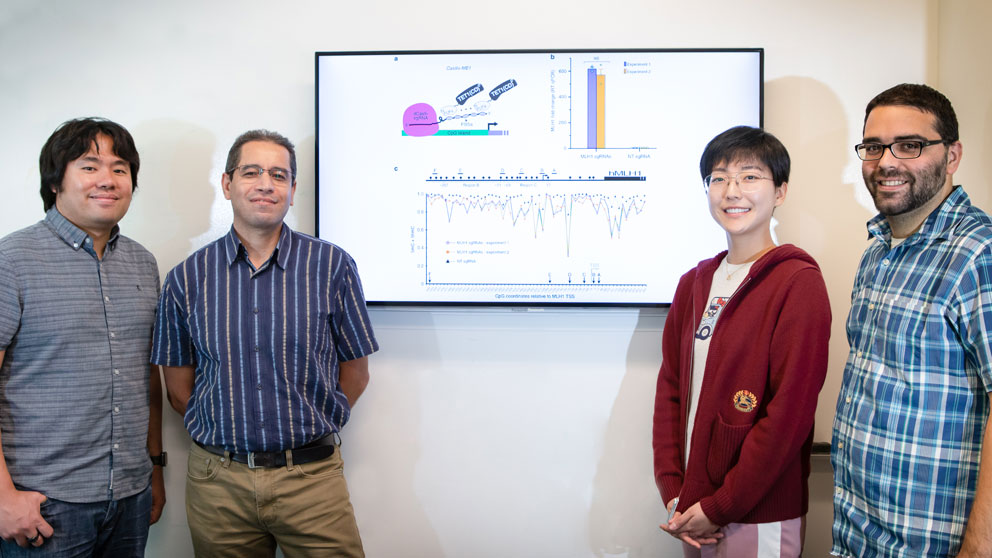 Albert Cheng (left) with his team at The Jackson Laboratory for Genomic Medicine in Connecticut. JAX photo by Charles Camarda.
Albert Cheng (left) with his team at The Jackson Laboratory for Genomic Medicine in Connecticut. JAX photo by Charles Camarda.
The genome editing tool, Casilio, can be used to efficiently remove methyl groups from DNA and activate expression of methylation-silenced genes in experimental systems.
CRISPR/Cas9 has revolutionized genome editing. The process is straightforward: by simple base-pairing, the guide RNA localizes to a particular site in the genome, where the accompanying Cas9 nuclease binds to the DNA and cuts it. And that’s it, an easy and accurate way to cut DNA at a specific sequence.
But what if you want to do more than that?
Making advancements to CRISPR technology
Jackson Laboratory (JAX) Assistant Professor Albert Cheng, Ph.D., developed a tool, Casilio, that makes it possible to manipulate genomes in many more ways. Previously described in Casilio gives CRISPR-Cas an upgradeA new gene regulation and labeling platform dubbed "Casilio" is expanding researchers' ability to study gene function and chromosome structure.a 2016 paper , Casilio uses a disabled version of Cas9 (dCas9) that still binds to the DNA but doesn’t cut it. It also includes a modular RNA binding system, called Pumilio, that can be attached to the guide RNA to deliver a protein effector (or multiple proteins) to the targeted DNA sequence. The result is a versatile tool that, instead of just cutting DNA, can alter its function in more nuanced ways.
“Compared to CRISPR/Cas9, Casilio is like a smart phone,” says Cheng. “With an old phone, you could call and maybe text, but that was it. With the smart phone, you can get apps to do all sorts of tasks. For example, you can listen to music while you play a game and receive texts. Casilio allows you to do several things simultaneously within the same genome.”
Casilio can be used to increase or inhibit gene expression, label specific DNA regions with fluorescent markers, and more. In a new paper published in Nature Communications, a team led by Cheng and Associate Research Scientist Aziz Taghbalout, Ph.D., presents an important new use for Casilio: epigenetic editing. Epigenetic changes, such as the addition or removal of methyl groups to DNA sequences, play vital roles in the regulation of gene expression. Aberrant DNA methylation is associated with various human diseases, including cancer. In “Enhanced CRISPR-based DNA demethylation by Casilio-ME-mediated RNA-guided coupling of methylcytosine oxidation and DNA repair pathways,” the team demonstrated a highly effective new way to demethylate DNA and activate genes at targeted DNA sequences.
Cheng has always been obsessed with technology-based solutions to complex problems, so this improvement to CRISPR technology is a logical step for the researcher. For more information about Cheng's technology-focused philosophy, click below to take a deeper look:
A modern toolkit for computational science
With Casilio, it’s possible to develop different modules—like the Smartphone apps—by adding more or different proteins to the Pumilio system. Cheng and his team achieved successful demethylation by delivering TET1, a demethylating enzyme, alone with a module they called Casilio-ME. Nonetheless, the intermediate steps involved with restoring the DNA base (cytosine) afterwards remained relatively inefficient, so they constructed two additional modules using proteins that facilitate DNA repair pathways to streamline restoration of unmethylated cytosine. Both of the additional modules (Casilio-ME2 and -ME3) “remarkably” boost the demethylation process, leading to greatly increased gene activation.
In addition to the augmented efficiency in editing methylation states of specific sequences by the Casilio-ME platforms, Casilio-ME2 and Casilio-ME3 showcase the ability of the Casilio system to bring multiple protein factors in close proximity at a targeted genomic sequence. This significantly expands the scope and applications of the Casilio system.
The result is a powerful new epigenetic research tool that represents an important step forward from current methods of DNA methylation editing. “These Casilio-ME platforms significantly expand 5mC (methylated cytosine) editing capability,” says Taghbalout. “They efficiently address the causal-effect relationships of epigenetic marks in numerous biological and pathological systems.”
Albert Cheng: Genetic Engineering
Albert Cheng is taking the key attributes of CRISPR/Cas and making this genetic tool more versatile.